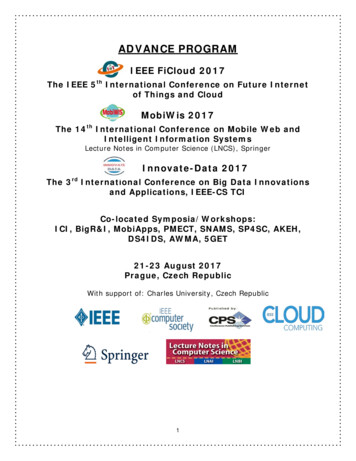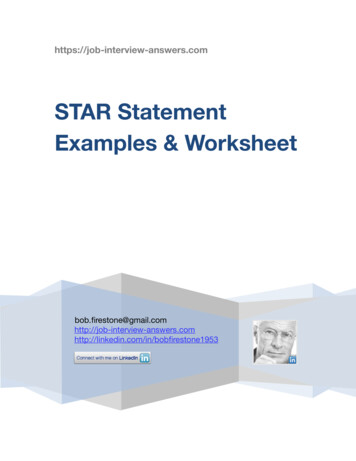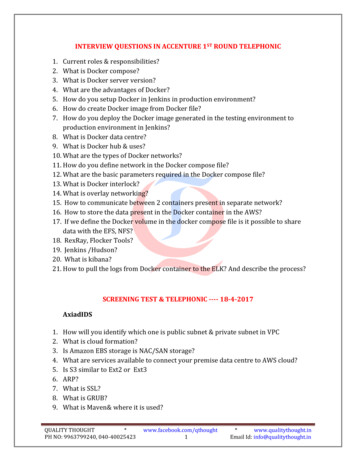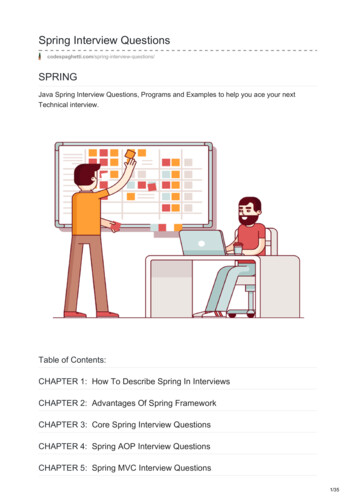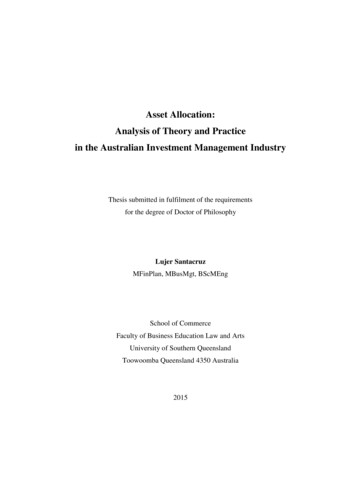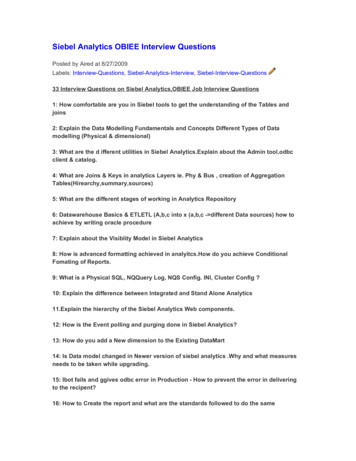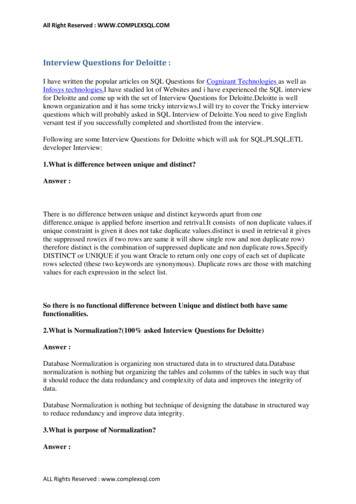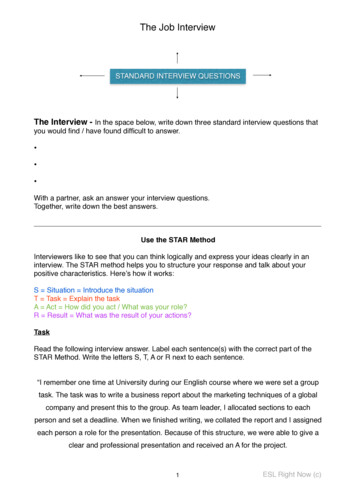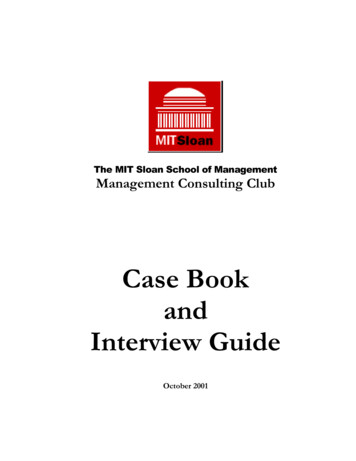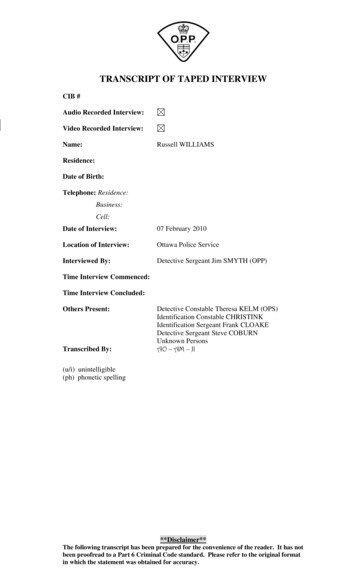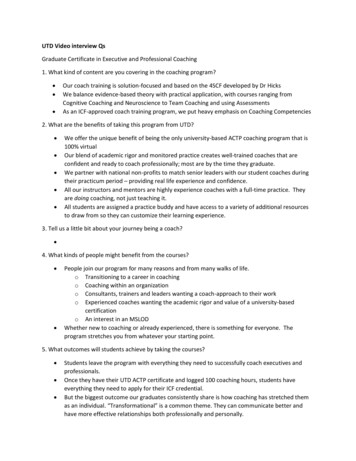
Transcription
UTD Video interview QsGraduate Certificate in Executive and Professional Coaching1. What kind of content are you covering in the coaching program? Our coach training is solution-focused and based on the 4SCF developed by Dr HicksWe balance evidence-based theory with practical application, with courses ranging fromCognitive Coaching and Neuroscience to Team Coaching and using AssessmentsAs an ICF-approved coach training program, we put heavy emphasis on Coaching Competencies2. What are the benefits of taking this program from UTD? We offer the unique benefit of being the only university-based ACTP coaching program that is100% virtualOur blend of academic rigor and monitored practice creates well-trained coaches that areconfident and ready to coach professionally; most are by the time they graduate.We partner with national non-profits to match senior leaders with our student coaches duringtheir practicum period – providing real life experience and confidence.All our instructors and mentors are highly experience coaches with a full-time practice. Theyare doing coaching, not just teaching it.All students are assigned a practice buddy and have access to a variety of additional resourcesto draw from so they can customize their learning experience.3. Tell us a little bit about your journey being a coach? 4. What kinds of people might benefit from the courses? People join our program for many reasons and from many walks of life.o Transitioning to a career in coachingo Coaching within an organizationo Consultants, trainers and leaders wanting a coach-approach to their worko Experienced coaches wanting the academic rigor and value of a university-basedcertificationo An interest in an MSLODWhether new to coaching or already experienced, there is something for everyone. Theprogram stretches you from whatever your starting point.5. What outcomes will students achieve by taking the courses? Students leave the program with everything they need to successfully coach executives andprofessionals.Once they have their UTD ACTP certificate and logged 100 coaching hours, students haveeverything they need to apply for their ICF credential.But the biggest outcome our graduates consistently share is how coaching has stretched themas an individual. “Transformational” is a common theme. They can communicate better andhave more effective relationships both professionally and personally.
6. What would a “typical” online class look like? Classes occur on Mon/Tues/Wed evenings from 5:30 – 7 CTWe are dedicated to providing a community feel to a virtual learning environment.o Classes occur on the WebEx platform, where students participate from anywhere in theworld on their computer or mobile deviceo We blend live interaction, chat and small breakout sessions where student can practicewhat they’ve learned.o We have an excerpt of a class on the UTDallas website “Sample a Class”o Our students are busy professionals. All classes are recorded so students can make upwhat they’ve missed (80% live attendance required by the ICF).Class resources and assignments are accessed via online eLearning
NPI Video My IntroductionPurpose of the video – know what you are signing up forPurpose of the program – joint valueWhat coaching ISo ICF defines coaching as partnering with clients in a thought-provoking and creativeprocess that inspires them to maximize their personal and professional potentialo Focuses equally on the who and the howo Client-generated solutionsWhat coaching ISNT – mentoring, training or therapy; isn’t about helping the coachResponsibilities of the Coacho Manage processo Ask questionso Reflecto Support and ChallengeResponsibilities of the Leadero Written agreemento Tangible, realistic goalo 6 sessions / 3 monthso Online evaluationProcesso Application by the deadlineo Assignment & introduction
This is Teresa Pool, the Director of the executive coach training program at UT Dallas. Thepurpose of this video is to provide you with a good understanding of the nonprofit initiative thatyou have been invited to participate in. This initiative pairs students in our coach trainingprogram with senior leaders in several nonprofits across the country, providing the students withvaluable real-life experience and leaders like yourself with free coaching over a period of threemonths.The Executive and Professional Coach Training certificate program has been part of the JindalSchool of Management at the University of Texas at Dallas since 2005. It is an 11-monthprogram with rigorous academic requirements.Our students are graduate-level working professionals that are in the final stages of theircertificate program. During their practicum.period, students are required to coach a leader forsix sessions and review the recorded sessions with their mentor to receive feedback forcontinuous Improvement. Before you commit your participation, we want to make sure youhave a good understanding of what coaching is - and isn't - and what is required of both youand the coach during the process.The International Coach Federation defines coaching as “partnering with clients in a thoughtprovoking and creative process that inspires them to maximize their personal and professionalpotential.” Coaching is not traditional mentoring, training or therapy. Coaches are trained touse powerful questions and insightful observation to help their clients come to new awarenessand to create new approaches and solutions. It is a goals-based process that is about stretchingboth The Who and the How of leadership.The coach is responsible for managing the process, scheduling the sessions, and establishingclear goals with the client. During each session the coach will ask questions, reflect what theyheard and challenge the client while supporting them through the desired change. Coacheshear both what you do say and what you don't, which allows you to hear yourself in a new anddifferent way!The leader is responsible for entering into a written agreement with the coach as required by theInternational Coach Federation and pre-approved by the nonprofit. You as the client come to theprocess with a tangible and realistic goal that you would like to achieve during the six sessions.These sessions will occur over three months with each session lasting between 30 and 45minutes. The sessions are recorded and the recordings are reviewed between the coach andtheir assigned mentor. The session recordings and content are considered highly confidentialand will never be shared outside of UTD’s coaching program and certainly not with your nonprofit.Coaching goals very widely. You may be onboarding into a new role or struggling with one ofyour direct reports. Maybe time management could use an upgrade or you want to set betterexpectations with your staff. Some want to have a better relationship with their leader or theirboard of directors. The coaching space creates this safe environment to brainstorm on newways of thinking and operating. It gives us a moment to stop and step back and see thingsdifferently.Each coaching session begins was something you would like to explore during that session thatwill help move you towards this overarching goal that you’ve defined. Each coaching sessionends with a self-assigned action or experiment that the you are committed to taking before your
next session. It is this combination of new awareness created during the coaching sessionsand the actions taken between them that create the desired change.After all the sessions are completed, you’ll participate in a brief online survey that provides usand your nonprofit with feedback about your experience. It is very important that you remaincommitted and engaged in the process through completion. This practicum experience andcompletion of all six sessions is a requirement for student graduation, which is why it isimportant to us and to you fully understand what you’re signing up for and what you have togain!If you’re interested in coaching after what you’ve heard today, your next step will be to completethe application using the link in the same email as this video. Allow approximately 4 weeksbefore the student assignment is made and your coach reaches out for an introduction.We consider this non-profit initiative to be a win-win for both sides: great experience for ourstudents and free coaching for you. We hope you’ll join us!
Class resources and assignments are accessed via online eLearning . NPI Video My Introduction Purpose of the video – know what you are signing up for Purpose of the program – joint value What coaching IS o ICF defines coaching as partnering with clients in a thought-provoking and creative process that inspires them to maximize their personal and professional potential o Focuses equally on .
